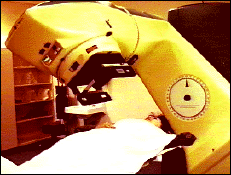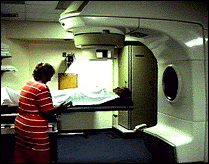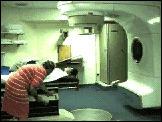
|

|

Radiation therapy is used in conjunction with lumpectomy to help kill any cancer cells that are still in your breast after the tumor and surrounding tissue are removed. Radiation therapy reduces the chance of cancer returning to the same breast.
Most women receive external radiation therapy. It is usually given during outpatient visits to a hospital or treatment center. This process is like having an x-ray. There are different machines for external radiation, depending on the kind and location of your cancer.
Radiation itself doesn't hurt, but it can have side effects. The most common is changes in your skin, which may appear sunburned and may darken over time - for some women the changes may persist. Some women get fatigued during the course of their treatment, but many continue to work or go about their usual activities.
Caption: A radiation therapy unit
Radiation therapy directs high-energy particles at the normal tissue in your breast that once surrounded the cancer. The first time, your therapist will mark your skin with tiny dots of ink to outline the treatment area. This will help to direct the beam correctly for the weeks of treatment.
Radiation therapy is usually given 5 days a week for 6 to 7 weeks. Weekend rest breaks allow normal cells to recover. This schedule helps protect your healthy body tissues by spreading out the total dose of radiation. The radiation dose and the number of treatments you need will depend on the size and location of your cancer, type of tumor, your general health, and any other treatments you may be receiving.
Your radiation sessions will take only 1 to 5 minutes per day. You will not see or hear the radiation, and you most likely won't feel anything during the sessions.
Your skin may appear sunburned and may darken over time when you undergo radiation therapy. Sometimes these changes return to normal, but some women are left with permanent skin changes Ð their breast may look or feel a little different.
You may notice that your skin in the treatment area may become reddened, irritated, sunburned, or tanned. After a few weeks you may have dry skin from the therapy.
With some kinds of radiation, treated skin may develop a moist reaction, especially in areas where there are skin folds. When this happens, the skin is wet and it may become very sore. It is important to tell your health care provider if you notice this kind of reaction. She or he can give you suggestions on how to keep these areas dry. Most skin reactions to radiation therapy should go away a few weeks after treatment is finished. In some cases, though, the treated skin will remain darker than it was before radiation therapy.
Caption: A patient receiving radiation therapy.
Guidelines for your skin:
Fortunately, most skin side effects will go away in a short time. If you happen to have a side effect that persists or is severe, your health care provider might prescribe a break in your treatments or change the kind of treatment that you are receiving.
It is given for 5 days a week for 6 or 7 weeks. Each session lasts about 15 to 30 minutes, but you will be getting your dose of radiation for only about 1 minute of this time. Some women may be given an extra "boost" of radiation to the site of the tumor at the end of the entire course of treatment.
Is external radiation therapy painful?
You most likely won't see or feel anything during your actual treatment, but it can leave changes in your skin's appearance. You may also feel tiredness, a skin reaction like sunburn, or itching and peeling of the skin. Many women have no side effects at all.
You do NOT become nauseated or vomit from radiation to your breast, and it does NOT cause you to lose your hair.
Will external radiation therapy affect my daily life?
The radiation may make you feel tired. You may want to plan less activities at work or home. You must go to the hospital 5 days a week. If you don't live near one, this may require a lot of driving.
Will my radiation therapy harm people around me?
External Radiation does not cause your body to become radioactive. There is no need to avoid being with other people because of your treatment. Even hugging, kissing and having sexual relations with someone will not expose them to radiation.
They radiated me from two different sides and there's no pain. Radiation is no pain at all. They just lay you on the table with your arm up and they mark all over your breast with black markings, and they lay a mold underneath to conform to the way you have to be laying on the table when you have your radiation. Most people are apprehensive about that, when the mold is being taken and the markings are all being done. The black markings were something that bothers a lot of people, and it bothered me, too, because I was afraid of losing all those marks when I showered. And of course, the hot flashes, perspiration destroyed them, too. But they just go on ahead and they just mark you up again.
Basically for me, it was very, very simple. It was a matter of going every day to the hospital and getting undressed to a point where you could get on the table, and therefore, they would use a laser light. I could see this red light shining down which marked the very spot where the radiation needed to hit. Forty-five seconds at the most and you're done. So except for the fact that it simply, absolutely interrupts every single day, the very process is very minor, in my case.
.
I jog and I walk every day, even with my radiation. Because it was during the summertime, I did my daily routine. I did experience a little tenderness somewhat, but not very much discomfort. So it was just like a daily routine.
The radiation treatments, each session just lasts about two minutes. I did miss one day because I had arranged to take my board's in family practice, which one has to do every seven years. I thought about canceling, but I had paid my money and done a lot of paperwork, and I decided to go ahead and do it. And I did pass. I didn't get the highest possible mark.
 up to Contents of this Page
up to Contents of this Page


The side effects of radiation therapy vary from patient to patient. Here are some general guidelines for dealing with side effects:
How long does external radiation therapy take? up to Contents of this Page
up to Contents of this Page
![]() Virginia's experience
Virginia's experience
![]() Nancy's experience
Nancy's experience
![]() Lottie's experience
Lottie's experience
![]() Judi's experience
Judi's experience
